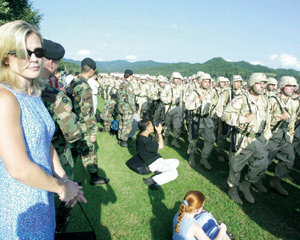- 학창시절 ‘동사+부사’로 된 구(句)를 수없이 암기했다. turn on(켜다)의 반대말은 turn off(끄다)지만, put on(옷을 입다)의 반대말은 take off이며 put off는 ‘연기하다’라고 밑줄 쳐가면서. 그리고 put on it은 틀린 표현이라고 별표를 쳤다. 대명사는 ‘동사와 부사 사이에 올 수 없다’고 외우긴 했는데, 왜 그런지에 대한 기억은 전혀 없다. pick it up은 되고 pick up it은 안 되는 이유, 그리고 ‘동사+부사’의 무수히 많은 용법을 상세히 알아보자.

조지 W 부시 미국 대통령은 1월10일 대(對)국민연설에서 이라크정책에 잘못이 있었으며 그 책임이 자신에게 있다고 말했다.
The situation in Iraq is unacceptable to the American people - and it is unacceptable to me. Our troops in Iraq have fought bravely. They have done everything we have asked them to do. Where mistakes have been made, the responsibility rests with me. (미국 국민은 이라크 사태를 용인할 수 없습니다 - 그것은 저 자신도 마찬가지입니다. 우리 군대는 이라크에서 용감하게 싸웠습니다. 그들은 우리가 요구한 모든 것을 해냈습니다. 잘못이 있었으며, 그 책임은 제게 있습니다.)
이라크, Bring it on!
거슬러 올라가 2003년 7월2일 부시 대통령의 백악관 즉석기자회견(impromptu news conference) 내용을 보자.
Anybody who wants to harm American troops will be found and brought to justice. There are some who feel (1)like if (2)they attack us that we may decide to (3)leave prematurely. They don’t understand what they’re talking about if that’s the case. Let me finish. There are some who feel (1-1)like that, you know, the conditions are such that (2-1)they can attack us there. My answer is, (4)bring’ em on. We’ve got the force necessary to deal with the security situation. (미국 군대에 위해(危害)를 가하려고 하는 자는 누구를 막론하고 찾아내어 정의의 이름으로 처단할 것입니다. 이라크가 공격하면(if they attack us) 우리가 조기에 출병(出兵)을 결정할 것이라고 생각하는 사람들이 있습니다. 이럴 경우 이들이 말하는 바를 이라크는 오해합니다. 내가 딱 부러지게 말하겠습니다. 아시다시피 이라크가 우리를 공격할 가능성이 있는(they can attack us there) 경우에 우리가 출병을 조기에 결정한다는 것이 우리의 방침이라고 생각하는 사람들이 있다는 겁니다. 나의 대답은 ‘한판 붙자’입니다. 우리는 안보상황에 대처하는 데 필요한 군대를 갖고 있습니다.)
(1)like와 (1-1)like는 목적어(that절)를 취하는 형용사다(that이 생략되면 like는 접속사가 된다). ‘It is like that we shall see him no more(아마도 더는 그를 만나지 못할 것이다)’에서 that 이하가 like의 목적어다. (2)they attack us가 (2-1)they can attack us로 바뀌었다. (3)에서 이라크가 미국을 공격하는 것을 attack이라고 한 반면 미국이 이라크를 공격하는 것은 leave(출병하다)라고 표현했다. can이라는 단어 하나 차이가 엄청나다. ‘미국에 위해를 가할 만한 나라는 그 위해가 닥치기 전에 미리 공격할 것’임을 암시한다. 이것이 곧 곧 부시 대통령의 ‘예방전쟁(preventive war)’ ‘선제공격(preemptive attack)’ 개념이다. 이러한 부시이즘(Bushism), (The Bush Doctrine)에 대해 얼마 전 사망한 역사학자 슐레진저(Arthur Schlesinger)는 “The Bush Doctrine converts us into the world’s judge, jury and executioner(부시 독트린은 우리를 세계의 재판관, 배심원, 집행인으로 만드는 것이다)”라고 비판했다. (4)Bring them on은 Bring it on의 복수형이다. 구어에서는 생략형인 Bring ’em on을 쓴다.

부시 미 대통령은 2003년, 이라크가 공격할 가능성만 있어도 이라크에 미군을 파병하겠다며 호전적인 태도를 취했다. 사진은 2004년 이라크로 파병되는 미2사단 환송식 광경.
부시의 이런 강한 발언(tough talk)에 대해 당시 민주당 대통령후보 지명에 나선 게파트(Dick Gephardt) 하원의원은 “enough of the phony, macho rhetoric(이제 대담한 척하는 수사(修辭)는 그만둬라)”고 일갈했다.
당시 미국 민주당 대통령후보로 유력시되던 존 케리 상원의원(나중에 민주당 대통령후보가 됐다)은 2004년 1월28일 CNN 기자로부터 부시에 대한 질문을 받고 이렇게 답했다. “I look forward to talking to real Americans about the real issues, and I’ll tell you, we’re ready. Bring it on(실제적인 이슈에 대해 신실한 미국인에게 말하기를 고대합니다. 나는 말합니다. ‘우리는 준비되어 있다. 한번 붙자’라고).”
목적어가 사라지는 이유
Bring it on!에서 it은 우리말의 ‘거시기’나 ‘거 안 있습니까?’쯤에 해당하는 비(非)인칭 목적어다. 어디에 써도 의미가 통하는 거의 무한한 용도를 갖는, 마음에서 마음으로 통하는 ‘이심전심(以心傳心)’ 공명(共鳴)어다.
그런데 부사(정확히는 전치사적 부사) on은 왜 붙어 있을까? on은 원래 전치사였다. Bring it on the ring! / Bring it on the ground! / Bring it on the battlefield! 등에서 밑줄 친 부분이 생략된 것이다.
bring on의 다른 예를 보자. The U.S presidential elections are bound to bring huge changes on the Korean Peninsula(미국 대통령선거는 한반도에 커다란 변화를 가져온다.) on의 목적어가 살아 있는 경우다. bring on war(전쟁을 일으키다) bring on danger(위험을 초래하다). bring on a panic(공황을 초래하다). bring on public criticism(물의를 일으키다). 이상은 on의 목적어가 사라지고 on만 홀로 남아 동사 bring 다음으로 도치된 경우다.
bring in의 경우를 보자. Bring in one of the substitutes(선수를 교체하라). The police had to bring in the FBI to rounded up the gang of criminals(경찰은 범죄자 일당을 검거하기 위해 FBI를 끌어들였다). The regime will take steps to bring in more foreign investment(정권은 더 많은 외국 자본을 유치하기 위한 조치를 취할 것이다). There is no such thing as a perfect solution. Introducing the law school system will naturally bring in new problems(완벽한 해법이란 건 없다. 로스쿨 시스템을 도입한다 해도 새로운 문제는 발생할 것이다). 이상은 모두 in의 목적어가 없어지고 in만 홀로 남아 동사 bring 다음으로 도치된 경우다.
▼ 구(句)동사(phrasal verb)의 다양한 의미
혼란을 피하기 위해 우선 용어를 정리해보자. ‘동사구(verb phrase)’는 ‘전치사수반동사(prepositional verb)’와 ‘구(句) 동사(phrasal verb)’를 포괄하는 상위개념이다. ‘자동사+전치사’로 이루어진 동사구를 ‘전치사수반동사’라고 하고 ‘타동사+부사’로 이루어진 동사구를 ‘구(句)동사(phrasal verb)’라고 한다. 이 둘의 차이는 엄청나다.
전치사수반동사는 각기 한 개의 의미만을 갖는다. The moon turns around the earth(달은 지구 주위를 돈다). 반면 부사(전치사적 부사)가 본래 어떤 형태였는지에 따라 구동사는 무수히 많은 의미를 갖는다.
turn out과 turnout

응원단 이야기를 다뤄 미국에서 큰 인기를 얻은 영화 ‘Bring It On’. Bring it on은 ‘한판 붙자’는 의미다.
‘turn(자동사)+out(부사)’의 경우를 보자. (1)A large crowd turned out to see him(turn out=appear: 많은 군중이 그를 보기 위해 나타났다). (2)Our revenue will turn out to be considerably better than we forecast(turn out=result : 수익 규모가 우리 예상보다 상당히 높아질 것으로 보인다). (3)It turned out to have had no effect(turn out=prove: 그것은 아무런 효과를 나타내지 못한 것으로 판명되었다).
명사로 사용된 turnout은 구동사의 의미를 그대로 이어받아 ‘생산고’ ‘생산액’ ‘출석자수’ ‘투표자수’의 뜻으로 쓰인다. We had a good turnout in our investment seminar(우리 투자설명회는 대성황이었다).
구동사 put on을 보자. 먼저 on의 목적어가 살아 있는 경우. Dad is a familiar parent who knows how to fix a little girl’s hair and how to put shoes on a three-year-old(아빠는 어린 딸의 머리를 손질할 줄 알며 세 살 된 아기에게 신발을 신겨주는 일도 할 줄 안다).
‘비행기 태우다’와 ‘놀리다’
나는 몹시 말랐다. (몸에) 무게를 늘리고 싶다(I am very thin. I would like to put weight on (my body)). (레인지에) 프라이팬을 얹어라(Put the frying pan on (the range)). (머리에) 모자를 쓴 채로 있어라(Keep your hat on (your head)). (몸에) 코트를 입고 있어라(Have your coat on (your body)). (이 상의에) 단추를 달아라(Sew a button on (the coat)). 괄호부분은 굳이 말하지 않아도 상호 인지되므로 생략한다.
‘He put on his socks wrong side out(그는 양말을 뒤집어 신었다)’은 ‘He put his socks on his feet and ankles wrong side out’에서 his feet and ankles가 생략되고 on이 동사 put 다음으로 도치됐다. ‘He put on an expression of dismay(그가 당황한 표정을 지었다)’는 ‘He put an expression of dismay on his face’에서 his face가 생략되고 on이 동사 put 다음으로 도치된 것이다. ‘I made a stupid mistake. I put on the right turn signal when I tried to turn left(바보 같은 실수를 저질렀어. 좌회전하면서 우회전 깜빡이를 켠 거 있지)’는 I put the right turn signal on the current에서 the current(전류)가 생략되고 on이 동사 put 다음으로 도치됐다.
Men in their generations are like the leaves of the trees. The wind blows and one year’s leaves are scattered on the ground; but the trees burst into bud and put on fresh ones when the spring comes round(각 세대의 인간은 나뭇잎과 같다. 바람이 불면 지난해의 잎은 땅 위로 흩날린다. 그러나 봄이 돌아오면 나무는 새싹을 틔우고, 새잎이 돋아난다). -호머(Homer)의 서사시 ‘일리아드(Iliad)’ 중에서.
우리말에 ‘비행기 태우다’란 말이 있다. 영어로는 ‘praise[laud] a person to the skies’다. 그런데 ‘떨어뜨릴 것을 전제로 비행기 태우기’ 할 때가 많다. 이렇게 되면 ‘아무개를 놀리다’란 의미가 된다. put on이 미국 구어에서 ‘아무개를 놀리다’란 의미로 사용된다. put a person on (a plane)에서 생성되었다고 유추하자.
A: Finally we get to see each other. I’m a little flustered. I did not expect such a beautiful girl like you to show up.(결국 만나게 되네요. 지금 약간 떨려요. 이렇게 아름다운 분이 나오실 줄 몰랐거든요.)
B: Stop putting me on. But thanks. It’s very good of you to say so(농담 그만하세요(놀리지 마세요). 그래도 그렇게 말씀해주시니 고마워요).
put on은 ‘~위에 놓다’는 기본적 의미에서 ‘(몸무게를) 늘리다’ ‘(옷을) 입다’ ‘(프라이팬을) 얹다’ ‘(모자를) 쓰다’ ‘(옷을) 입다’ ‘(단추를) 달다’ ‘(양말을) 신다’ ‘(표정을) 짓다’ ‘(전등을) 켜다’ ‘(새 잎을) 틔우다’ ‘(사람을) 놀리다’ 등의 다양한 의미를 나타낸다.
“오늘은 내가 쏜다”
‘pick up’을 살펴보자. (1)I’ll pick up the tab(내가 계산서를 집겠다 → 내가 돈을 내겠다). 다른 표현으로는 I’m buying / I’m treating / This one is on me / It’s my turn to treat. (2)He picked up French(그는 불어를 주워들어 익혔다). 여기에서 pick up의 정확한 의미는 ‘learn a foreign language without taking lessons or studying(배우거나 공부하는 일 없이 외국어를 주워들어 알게 되다)’이다. (3)What time should I pick you up(몇 시에 (차로) 당신을 모시러 갈까요)? (4)I have picked up my coat from the cleaner’s(세탁소에서 양복상의를 찾아왔다). (5)She slipped and fell, but quickly picked herself up(그녀는 미끄러져 넘어졌으나 재빨리 몸을 일으켜 세웠다). (6)I picked up a magazine that was lying on the table(나는 탁자에 놓인 잡지 한 권을 집어 들었다). (7)He picked up a livelihood by selling things from door to door(그는 가가호호 방문 판매하여 생계비를 벌었다).
▼ 〈타동사+부사〉와 〈자동사+전치사〉 구분 요령
같은 단어가 타동사로도 쓰이고, 자동사로도 쓰이는 데다, 부사도 되고 전치사도 되는 경우가 있어 ‘타동사+부사’와 ‘자동사+전치사’를 구분하기가 모호하다. 혼동하지 않고 정확히 구분해내는 방법을 제시한다.
get through를 예로 보자. He got through the examination과 He got through the thread을 비교해보자. ‘자동사+전치사’라고 간주할 경우, 첫 문장은 ‘그는 시험을 통과했다’이고, 두 번째 문장은 ‘그는 실을 통과했다’가 된다. 두 번째 문장의 뜻이 어색하다. 따라서 후자는 ‘타동사+부사’ 형태로 봐야 한다. He got the thread through (the eye of the needle)(그는 실을 (바늘귀에) 꿰었다)에서 through가 앞으로 도치된 것이다.
She turned on the man과 She turned on the microwave를 비교해보자. ‘자동사+전치사’로 간주할 경우, 첫 문장은 ‘그녀가 그 남자에게 대들었다’이고, 후자는 ‘그녀가 전자레인지에 대들었다’이다. 두 번째 문장의 의미가 우스꽝스럽다. 그러면 ‘타동사+부사’ 형태로 보고 의미를 따져보자. She turned the microwave on (the current)(그녀는 전자레인지의 스위치를 돌려서 전류에 접속시켰다 → 그녀가 전자레인지를 켰다)에서 on이 앞으로 도치된 것이다.
The car ran down the hill과 The car ran down the man을 비교해보자. ‘자동사+전치사’로 간주할 경우, 첫 문장은 ‘그 차는 언덕 아래로 달렸다’이고, 두 번째 문장은 ‘그 차는 그 사람 아래로 달렸다’이다. 두 번째 문장의 의미가 어색하다. 따라서 두 번째 문장은 ‘타동사+부사’ 형태로 보는 게 옳다. The car ran the man down(the car itself).(자동차가 그 사람을 들이받아 그 차 아래로 쓰러뜨렸다 → 자동차가 그 사람을 들이받았다)에서 down이 도치된 것이다.
‘그는 릴(얼레)을 감아 물고기를 끌어올렸다’의 영어표현은 He reeled in a fish다. in을 전치사로 보면 ‘고기 속으로’라는 엉뚱한 말이 된다. in은 전치사적부사로 본래의 문장은 ‘He reeled a fish in the frame’이다. ‘그는 명주실을 릴(얼레)에 감았다’의 영어표현은 ‘He reeled silk in the frame’ ‘He reeled silk in’ ‘He reeled in silk’이다.
‘전구를 끼워라(Screw a light bulb in)’에서 in은 in the socket의 함축적 표현이다. ‘쪽수는 나중에 기입해라(Write the page numbers in later)’에서 in은 in the pages를 줄여 쓴 것이다. ‘비타민 A와 C 섭취를 위해 녹황색 채소와 과일을 먹고 있다(I take in green and yellow vegetables and fruits to get vitamin A and C)’에서 in은 in my body의 함축 표현이다. ‘put in a good word for a person’은 무슨 의미일까? ‘아무개에 대해서 좋게 이야기하다’란 뜻이다. ‘제 얘기를 잘 좀 해주세요’는 Put in a good word for me이다.
I’m throwing(tossing) in the towel. You’re the winner of the day(난 포기할래. 오늘의 승자는 너야.) 권투 경기 중 한쪽이 일방적으로 지고 있을 때 매니저가 수건을 던져 경기를 포기할 의사가 있다고 밝히는 데서 유래한 표현이다. 생성과정은 이렇다. throw(toss) the towel in the ring → throw(toss) the towel in (=throw(toss) in the towel).
Can you squeeze me in?
Can you pencil me in?(뵐 수 있도록 시간을 내줄 수 있을까요?)은 Can you pencil me in your schedule(연필로(=임시로) 내 이름을 너의 스케줄(일정)에 써넣을 수 있느냐)?에서 비롯된 표현이다. 같은 표현으로 Can you fit me in?이 있다. 역시 in 다음에 your schedule이 생략된 표현이다. fit은 ‘(~을 ~사이에) 끼워넣다’란 뜻이다. fit a key in a lock(열쇠를 자물쇠에 끼우다).
꽉 찬 일정 사이에 새로운 일정을 끼워넣어야 하는 경우 ‘Can you squeeze me in?’이라고 한다. squeeze에는 ‘짜내다’ ‘밀어(쑤셔)넣다’라는 의미가 있다. squeeze juice from an orange(오렌지에서 과즙을 짜내다). squeeze clothes into a small bag(작은 가방에 옷가지를 쑤셔넣다). ‘squeeze somebody in’은 ‘(바쁜 일정 중에) 누군가를 만나다’로 해석된다.
A: I’d like to meet you this afternoon(오늘 오후에 좀 만났으면 좋겠는데).
B: My schedule is already full(일정이 이미 꽉 찼어).
A: Can you squeeze me in(어떻게 시간 좀 내줄 수 없어)?
이럴 때도 squeeze in이 유용하다.
A: This is an emergency. My tooth really hurts! Do you think Dr. Robert can see me today(급합니다. 이가 정말 아파요! 로버트 선생님께 오늘 진료를 받을 수 있을까요)? B: The doctor is booked up. But we can squeeze you in at 3:00(예약이 꽉 찼습니다만, 3시로 맞춰보지요).
‘새해를 맞이하다’를 영어로 어떻게 표현하면 좋을까? see the New Year in이 좋은 표현이다. ‘see a person in(안으로 안내하다)’의 연장선에서 이해하면 된다.
A: 2006 is almost gone(2006년이 다 갔어).
B: This year has really flown by. Let’s see the New Year in, having brilliant expectations(올해 진짜 빨리 지나갔어. 새해를 맞이하자, 참으로 좋은 일이 있을 거라는 기대를 안고서).
hand in과 send in의 차이
‘보고서를 직접 제출하라’의 영어표현은 Hand in the report이다. Hand the report in the hand(보고서를 the hand(받을 사람의 손)에 들어오게 제출하라)가 모체다. turn in과 give in도 같은 의미로 사용된다. The jury turned in an illegal verdict to the judge(배심원은 위법평결을 판사에게 제출했다).
An professor had a strict policy that his examinations were to be completed at the bell and anyone who kept writing on their exam after the bell would take a zero on the exam. Well, one guy kept writing on his exam for a while after the bell and then confidently strode up to turn it in. The professor said, “Don’t bother to hand that paper in. You get a zero.” (한 교수의 시험 감독 방침은 엄격했다. 종소리와 함께 시험을 끝내야 하며 이후에도 답안지를 작성하는 학생에게는 빵점을 준다. 그런데 한 학생이 종이 울린 뒤에도 계속 답안지를 작성하더니 그것을 제출하려고 성큼성큼 걸어 나갔다. “낼 것 없네. 학생은 빵점이야”라고 교수는 말했다).
‘직접제출’로 의미를 한정할 필요가 없을 경우엔 send in을 쓴다. Interested candidates meeting the above requirements are invited to send their resumes and/or call(상기 자격을 갖춘 관심 있는 분은 이력서를 보내거나 전화 주십시오). send는 단순히 ‘보내다’라는 의미지만 ‘send in’이라고 하면 ‘보내서 (해당인의) 손에 들어오게 하다’라는 뜻이 된다.
A: You should hurry and send in your resume(이력서를 서둘러 보내주셔야 합니다).
B: Could I drop off my resume in person(제가 직접 가서 제출해야 하나요)?
A: We prefer you apply on-line(저희는 인터넷 접수를 선호합니다).
미국의 여성 시인 엘라 히긴슨(Ella Higginson)의 ‘Four-leaf Clover(네 잎 클로버)’란 시의 한 구절을 보자.
One leaf is for hope, and one is for faith,
And one is for love, you know,
And God put another one in for luck
If you search, you will find where they grow.
알다시피 한 잎은 희망을, 한 잎은 믿음을,
그리고 한 잎은 사랑을 의미하잖아요,
그리고 신은 행운을 의미하는 또 다른 하나를 만드셨죠-
찾아보면 어디에서 자라는지 알 수 있지요.
3행 ‘God put another in for luck’은 ‘God put another in one clover for luck’에서 ‘one clover’가 생략됐다. another는 another leaf.
scream one’s head off
Love your neighbors, but don’t pull down the fence(이웃을 사랑하되 담을 허물지는 마라.) talk down a person(남을 말로써 이기다). face down a person(남을 위압하다). 모두가 ‘타동사+부사’ 형태다. 힐러리 클린턴 민주당 상원의원이 차기 대통령 입후보를 위한 준비위원회를 구성하겠다고 천명하면서 한 말을 보자.
I have never been afraid to stand up for what I believe in or to face down the Republican machine. After nearly $70 million spent against my campaigns in New York and two landslide wins, I can say I know how Washington Republicans think, how they operate, and how to beat them. (나는 지금껏 내가 믿고 있는 바를 밀어붙이거나 공화당 후보를 위압하는 데 두려움을 느껴본 적이 없습니다. 뉴욕에서 상대 진영이 7000만달러 가까이 썼음에도 두 번이나 압승을 거둔 나는 워싱턴의 공화당원들이 어떻게 생각하고, 어떻게 움직이며, 그들을 어떻게 이길 수 있는지 알고 있다고 말할 수 있습니다.) * machine: 미국 정당의 지배 세력, 간부(진), 조직을 뜻하는 집합명사
‘목이 터져라 고함 지르다’는 scream at the top of one’s voice(lungs)이다. 그런데 왠지 진부하다. 좀더 실감나는 표현은 scream one’s head off(목이 떨어져 나갈 정도로(목청껏) 소리 지르다)이다. When I put her down, my daughter sometimes screams her head off. I know which cries are the ones that she wants to be picked up and which ones are the ones that she’s hurt or something.(딸을 뉘어놓을 때 때때로 목이 터져라 울어댄다. 나는 어떤 울음이 안아달라는 건지, 아프다는 건지 구분할 수 있다.)
▼ 목적어를 어디에 둘 것인가
‘자동사+전치사’ 형태일 때 그 사이에 목적어를 둘 수 없다. 전치사란 전치(前置)라는 말 그대로 목적어 앞에 두어야 한다. The moon turns around the earth.(○) The moon turns the earth around.(×)
그러나 구동사 ‘타동사+부사’의 경우, 부사는 그 원래 위치가 목적어 다음이기는 하나, 목적어 앞으로 도치할 수 있다. He turned out the light.(○) He turned the light out.(○) 단 의문사가 있는 경우 부사가 의문사 앞으로 갈 수는 없다. What are you putting on?(○) On what are you putting?(×)
put on it이 안 되는 이유
‘그녀는 모자를 썼다, 그러나 다시 그것을 벗었다’는 ‘She put her hat on, but took it off again’이다. put on her hat은 가능하나 took off it은 불가능하다. ‘그는 모자를 하나 사서 그것을 썼다’는 ‘He bought a hat, and he put it on’이다. put on it은 불가능하다. 우리나라의 모든 학습서는 그 이유와 배경은 설명하지 않은 채 ‘대명사는 동사와 부사 사이에 올 수 없다’는 걸 암기하도록 가르치고 있다.
그러면 왜 그러한가? 앞의 두 문장에서 it은 앞에 언급된 모자를 다시 지칭하는 것으로 그 중요성이 떨어진다. 이 문장에서 중요한 건 벗었는지 썼는지, 즉 on이냐 off냐다. 목적어(it)도 단음절이고 부사(off/on)도 단음절로 같은 음가(音價)일 때는 의미상으로 중요한 말을 문장 끝에 놓고 강하게 발음한다. 다음의 예를 보면 이해하기가 더 쉽다.
강조하고자 하는 부분을 가장 돋보이는 곳(문장 앞쪽 가장자리 또는 문장 뒤쪽 가장자리)에 놓는 것을 ‘강조를 위한 도치(Emphatic Inversion)’라 한다. 전방(前方)도치의 예를 보자. 그것은 정말 싸구나(A steal it is ← It is a steal)! 사람은 자기의 비밀을 털어놓는 누군가에게 자신의 자유를 맡긴다(To whom you tell your secrets, you resign your liberty ← You resign your liberty to whom you tell your secrets).
후방(後方)도치의 예를 보자. 희망이 남아 있지 않은 곳에 두려움도 남아 있지 않다(Where no hope is left, is left no fear ← Where no hope is left, no fear is left). 자기 자랑을 하면 체면 손상이 뒤따른다(When pride comes, then comes shame ← When pride comes, then shame comes).
‘(다른 사람 아닌) 나에게 그것을 주세요’는 Give me it(×). Give it me(○). Give it to me(○). ‘(다른 것 아닌) 이것을 나에게 주시오’는 Give this to me(×). Give this me(×). Give me this(○). 구동사의 목적어가 짧고 강세가 없는 단음절일 때도 같은 원리가 적용되는 것이다.
새로운 정보를 문장 끝으로
‘pick it up’은 ‘속력을 더 내라’는 주문에 쓰이기도 하고, 연출자가 연기자에게 ‘ 빨리 다음 동작으로 들어가라’고 지시할 때도 쓰인다. 여기서 it은 비인칭 목적어다.
A: Hit the accelerator(가속 페달을 세게 밟아라. 속력을 내라).
B: You don’t want me to run a red light, do you(빨간 불을 무시하고 달리라는 말은 아니겠지요)?
A: Of course not. What I mean is pick it up(물론 아니지. 속력을 좀 내란 뜻이야). pick it up 대신 speed it up/ Step on it/ Step on the gas를 써도 된다. 모두 ‘가속 페달을 밟아라’ ‘속력을 내라’는 의미다. 그런데 Step on it이 좀 이상하지 않은가? step은 ‘밟다’라는 의미의 자동사이기 때문에 반드시 ‘~위를’ 뜻하는 전치사 on이 바로 뒤에 붙어야 한다. 그래서 Step it on 이나 Step the gas on으로 쓸 수 없다. ‘나는 그의 발을 밟았다’를 I stepped on his foot이라고 하지 I stepped his foot on이라고 하지 않는 것도 마찬가지 이유다. 여기서 the gas는 기체/가스/휘발유란 뜻 외에 (자동차의) 가속 페달을 의미한다. Take your foot off the gas(가속 페달에서 발을 떼라, 속도를 줄여라).
‘누군가를 꾸짖으려고 한다면, 나에게 호통 치시오’를 영작해보자. If you want to blow up somebody, blow up me.(○) If you want to blow up somebody, blow me up.(×) 내용상 me가 중요하기 때문에 문장 맨 끝에 놓고 강하게 발음한다. We gave it up for lost(우리는 그것을 잃어버린 것으로 단념했다). 여기서는 ‘포기했다’는 게 가장 중요한 정보다. ‘그것’은 별로 중요치 않다. He put them off till the next week(그는 다음 주일까지 그것들을 연기했다). ‘그것들’은 별로 중요하지 않고, ‘연기했다’는 게 새로운 정보다. Help me on(off) with my coat, please(미안하지만 윗도리 입는(벗는) 걸 거들어주세요). ‘나(me)’는 상호 이미 알고 있는 내용이고, ‘입다(벗다)’가 중요한 정보다.
Speed things up(일의 능률을 올려라). 이 문장의 요지는 능률을 ‘위로’ 올리라는 것이다. It was a common practice to take work home at night(밤에 일거리를 집으로 가져가는 것이 일반적인 일이었다). 이 문장에서는 ‘집으로’가 중요하다.
Give him up(그를 포기하시오). Give up Tom(톰을 포기하시오). 앞 문장은 ‘포기하라’는 게 문장의 요지고, 뒷 문장은 ‘톰’이라는 특정인을 지칭하는 게 목적이다.
떼려야 뗄 수 없는 관계
다음의 경우는 부사를 반드시 목적어 다음에 놓는다. 먼저 부사가 and와 같은 등위접속사로 다른 부사와 결합되어 있을 경우다. Draw your stomach in and up(배가 쏙 들어가게 했다가 다시 내밀어보세요). 부사가 바로 뒤에 있는 전치사구, 특히 방향을 나타내는 것과 긴밀하게 결합되어 있을 경우에도 부사를 목적어 다음에 둬야 한다. He clawed his way back up the cliff(그는 손끝으로 벼랑을 기어올라갔다). He ordered survivors back to the oars(그는 생존자들에게 노를 저어 되돌아가라고 명령했다). They took the boy away from his parents(그들은 소년을 부모에게서 떼어냈다). 부사를 전치사로 오해할 우려가 있을 때도 목적어를 부사 앞에 둔다. ‘The doctor looked Tom over(의사는 톰을 진찰했다)’는 ‘타동사+목적어+부사’ 형태이고, ‘The doctor looked over Tom(의사는 톰을 어깨너머로 바라봤다)’는 ‘자동사+전치사+목적어’ 형태다.
동사와 부사를 잇따라 놓을 수밖에 없는 경우도 있다. 목적어가 길 때다. I heard the company is bringing out a new kind of home computer(그 회사가 가정용 신형 컴퓨터를 출시한다고 들었다). He picked up the pen which lay on the desk(책상 위에 놓인 펜을 집어 들었다). 동사가 다른 동사와 등위접속사로 결합되어 목적어를 공유할 때도 동사와 부사 사이에 목적어를 끼워 넣을 수 없다. The doctor cleaned and sewed up wounds(의사는 상처를 소독하고 꿰맸다). 반대로 목적어가 등위접속사로 연결되어 있을 때도 동사와 부사를 연이어 쓴다. They brought back themselves and as many man as they could(그들은 자신뿐 아니라 가능한 한 많은 사람을 데리고 돌아왔다). 목적어가 대명사이긴 한데 길고 강세가 있을 때도 동사와 부사 사이에 넣지 않고 부사 뒤에 쓴다. Mother wants us to give up everything(어머니는 우리들이 모든 것을 포기하길 원하셨다). We should always lay by something for a rainy day(우리는 항상 만일의 경우를 대비해 뭔가를 비축해야 한다). They brought back themselves as they had been told to do so(그들은 지시받은 대로 스스로 돌아왔다).
동사와 부사가 결합해서도 각각의 뜻을 잘 보존하고 있으면 떼어 쓰기 좋지만 비유적이거나 추상적인 의미를 만들어내면 떼어놓기 어렵다. Carry your things out(네 물건들을 밖으로 빼내라). Carry out your plans(네 계획들을 실행해라). 첫 문장이나 두 번째 문장 모두 ‘타동사+부사’ 구조이나 ‘밖으로 들어내다’의 의미일 때는 carry와 out 본래의 의미가 그대로 살아 있어 분리해 써도 무리가 없으나 두 단어가 결합해 ‘실행하다’라는 새로운 의미가 됐을 때는 붙여 쓰는 경향이 강하다. 그러나 수동태이면 어느 경우든 떼어놓을 수 없다. Your things were carried out. Your plans were carried out.
대체로 목적어가 짧을 때, 특히 단음절의 인칭 대명사일 때 동사와 부사가 목적어를 사이에 두고 갈라진다. 목적어가 길면(고유명사일 때도) 동사와 부사를 연이어 쓴다. 목적어가 3음절 미만일 때는 동사와 부사를 붙여놓기도 하고, 떼어놓기도 한다.
“끝장을 보자”
‘살이 비치는 블라우스’를 see-through blouse나 diaphanous blouse라고 한다. through는 다양한 용도로 쓰인다. 먼저 전치사로 사용된 경우다. I saw through(into) him(그가 어떤 인물인지 알았다). I saw through(into) his design(그의 계책을 알아차렸다). I saw through(into) his intention(그의 의도가 들여다보였다). We can see distant objects through a telescope(우리는 망원경으로 멀리 있는 물체들을 볼 수 있다)에서는 through a microscope가 saw를 수식하는 부사구 구실을 한다. He saw her through her troubles(그는 그녀의 고생을 끝까지 도와주었다)에서는 through her troubles가 her를 서술하는 형용사구다. see a person through(어떤 사람의 뒤를 끝까지 돌보아주다). 이 경우 see through‘자동사+전치가’와의 혼동을 피하기 위해 see와 through를 반드시 분리해 써야 한다. ‘끝까지 지켜보다’ ‘끝장을 보다’는 watch to the end로 하기보다 see a thing through(out)로 하는 것이 감칠맛 난다. through에는 시간적으로는 ‘끝까지’라는 ‘시간상의 완전’이라는 개념이 포함되어 있다. from Tuesday to Saturday라고 하면 Saturday가 포함되는지 분명하지 않으나, from Tuesday through Saturday라고 하면 Saturday가 포함되는 것이 분명해진다.
|
through가 전치사적 부사로 사용되는 경우도 있다. through는 기본적으로 통(通)의 의미를 갖는다. 현지에서는 ‘전화가 연결됐다’를 The connection was made라고 하기보다 The call was put through라고 한다. Put me through to the fire department(소방서를 대주십시오).
A: I have to make an emergency call(긴급전화를 하고 싶은데요).
B: I’ll put you right through(즉시 연결해드리겠습니다).




















![[밀착취재] 리딩방 70여 명 대부분이 한통속…기망하는 수법까지 매뉴얼화](https://dimg.donga.com/a/380/211/95/1/ugc/CDB/SHINDONGA/Article/69/48/98/bd/694898bd2399a0a0a0a.jpg)


![[지상중계] 제12회 나지포럼, “북미 정상회담 성과내기 어려워”](https://dimg.donga.com/a/380/211/95/1/ugc/CDB/SHINDONGA/Article/69/43/48/32/69434832107aa0a0a0a.jpg)
